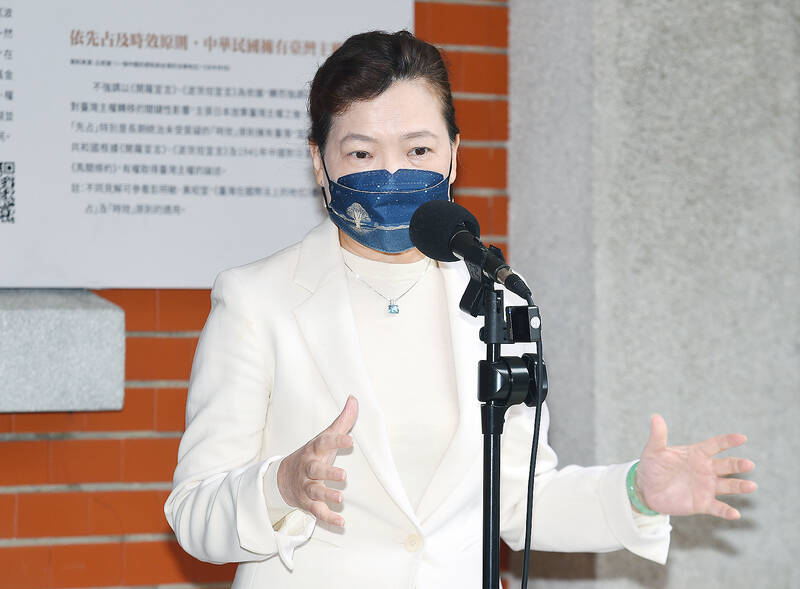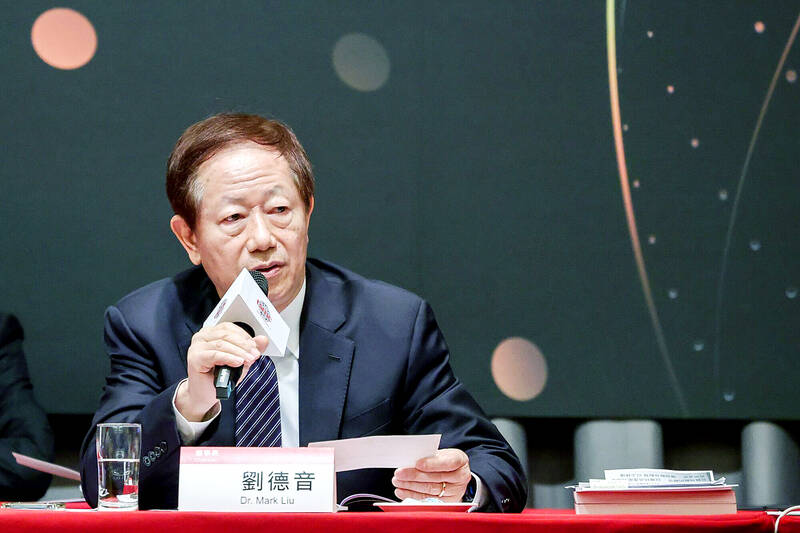The Ministry of Economic Affairs aims to quadruple the nation’s share of electricity from renewable sources to 90 billion kilowatt-hours (kWh) by 2030, it said yesterday, as a growing number of local enterprises set goals to achieve carbon neutrality.
Renewable energy, primarily from solar and wind sources, soared more than 80 percent to 23.8 billion kWh last year from 12.7 billion kWh in 2016, Bureau of Energy data showed.
The ministry’s announcement came after Taiwan Semiconductor Manufacturing Co (TSMC, 台積電) on Tuesday said that it would not be able to achieve carbon neutrality by 2030 because of a scarce supply of renewable energy in Taiwan. The world’s biggest contract chipmaker joined the global corporate renewable energy initiative RE100 in 2020, committing to use only electricity from renewable sources by 2050.

Photo: Liao Chia-ning, Taipei Times
“The supply of 20 million kWh is insufficient,” company chairman Mark Liu (劉德音) told shareholders during its annual general meeting.
TSMC’s overseas fabs in China and the US have reached a balance between emitting carbon and absorbing carbon emissions, Liu said.
The company reached net zero emissions by using renewable energy sources, and purchasing carbon credits and renewable energy certifications to offset emissions, the company said in its annual report.

Photo: Cheng I-hwa Cheng, Bloomberg
Liu urged the government to step up its renewable energy efforts and called on state-owned Taiwan Power Co (Taipower, 台電) to increase the supply of electricity from renewable sources.
Only 10 percent of the electricity available for local businesses is sourced from renewable energy, he said.
The chipmaker operates a 12-inch fab and an 8-inch fab in China and an 8-inch fab in the US through its subsidiary WaferTech LLC. In Taiwan, it operates four 12-inch wafer gigafabs, four 8-inch wafer fabs and one 6-inch wafer fab.
TSMC also said its power consumption would continue to rise as it builds more facilities in Taiwan.
More than 75 percent of its greenhouse gas emissions come from electricity consumption, it said.
The chipmaker purchased 900 million kWh of electricity from renewable sources last year, Liu said.
In April, the company signed on to a joint procurement renewable energy program in Taiwan and a long-term renewable purchase agreement with ARK Power (誠新電力) to provide TSMC and its suppliers with 1 billion kWh per year for 20 years. TSMC would use half of that supply.
The bureau yesterday dismissed the chipmaker’s criticisms, saying that the government has liberalized the nation’s green electricity market, and that every company has full access to renewable energy from private power providers, or independent power developers.
The bureau said it respects the free-market mechanism.
Taipower is obligated to purchase renewable energy from power developers through a feed-in-tariff mechanism, the bureau said in a statement yesterday.
It also allows for supplying electricity from renewable resources to private enterprises, as energy purchase agreements with suppliers are severable contracts.
Private power suppliers are allowed to end contracts with Taipower and to sell power to new buyers, the statement said.
About 120 companies sourced 2.55 billion kWh of renewable energy last year, it said.

Intel Corp chief executive officer Lip-Bu Tan (陳立武) is expected to meet with Taiwanese suppliers next month in conjunction with the opening of the Computex Taipei trade show, supply chain sources said on Monday. The visit, the first for Tan to Taiwan since assuming his new post last month, would be aimed at enhancing Intel’s ties with suppliers in Taiwan as he attempts to help turn around the struggling US chipmaker, the sources said. Tan is to hold a banquet to celebrate Intel’s 40-year presence in Taiwan before Computex opens on May 20 and invite dozens of Taiwanese suppliers to exchange views

Application-specific integrated circuit designer Faraday Technology Corp (智原) yesterday said that although revenue this quarter would decline 30 percent from last quarter, it retained its full-year forecast of revenue growth of 100 percent. The company attributed the quarterly drop to a slowdown in customers’ production of chips using Faraday’s advanced packaging technology. The company is still confident about its revenue growth this year, given its strong “design-win” — or the projects it won to help customers design their chips, Faraday president Steve Wang (王國雍) told an online earnings conference. “The design-win this year is better than we expected. We believe we will win

Chizuko Kimura has become the first female sushi chef in the world to win a Michelin star, fulfilling a promise she made to her dying husband to continue his legacy. The 54-year-old Japanese chef regained the Michelin star her late husband, Shunei Kimura, won three years ago for their Sushi Shunei restaurant in Paris. For Shunei Kimura, the star was a dream come true. However, the joy was short-lived. He died from cancer just three months later in June 2022. He was 65. The following year, the restaurant in the heart of Montmartre lost its star rating. Chizuko Kimura insisted that the new star is still down

While China’s leaders use their economic and political might to fight US President Donald Trump’s trade war “to the end,” its army of social media soldiers are embarking on a more humorous campaign online. Trump’s tariff blitz has seen Washington and Beijing impose eye-watering duties on imports from the other, fanning a standoff between the economic superpowers that has sparked global recession fears and sent markets into a tailspin. Trump says his policy is a response to years of being “ripped off” by other countries and aims to bring manufacturing to the US, forcing companies to employ US workers. However, China’s online warriors